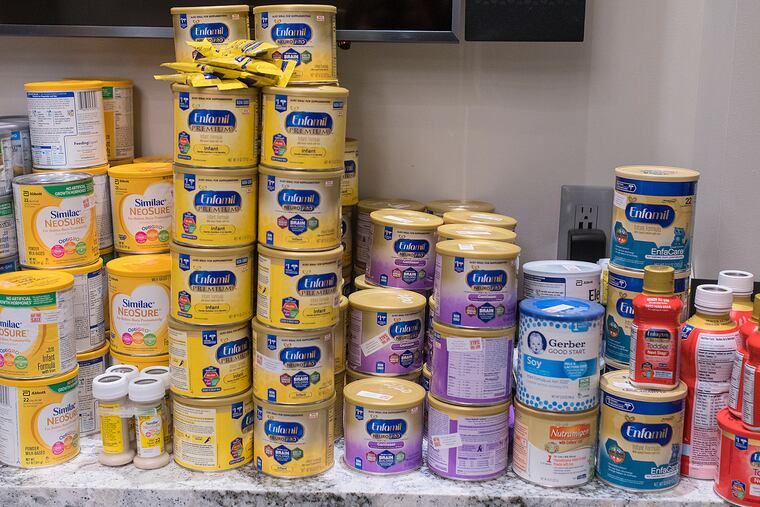Burlco and other N.J. counties (finally) moving from paper WIC to EBT cards for food benefits
Advocates for WIC families are happy to see an "antiquated" paper system go.

Finally transitioning from the 20th to the 21st century, New Jersey’s WIC program is moving from paper vouchers to EBT (electronic benefits transfer) cards.
A few northern and central counties have already begun. Both Burlington and Atlantic Counties will start the process of becoming paperless by Feb. 23.
The rest of South Jersey will follow, hoping to allow WIC clients to purchase healthy foods for themselves and their children with eWIC cards by the spring, according to Lisa Asare, assistant commissioner of the Division of Family Health Services in the New Jersey Department of Health.
New Jersey and Georgia are the last states in the nation to move from paper to EBT cards, according to Brian Dittmeier, senior director of public policy for the National WIC Association in Washington.
WIC is shorthand for the Special Supplemental Nutrition Program for Women, Infants, and Children. It provides nutrition services, breastfeeding support, health care, and healthy foods to participants. WIC is overseen by the New Jersey Department of Health, and is funded by the U.S. Department of Agriculture. The program serves low-income pregnant women, new mothers, and children under age 5.
An average of 145,000 New Jersey residents participate in WIC monthly, state officials said.
Congressional order
Like all states, New Jersey was ordered by Congress in 2010 to switch from cumbersome paper vouchers to EBT cards by 2020.
New Jersey received an exemption because it needed increased staffing and funding to transition, Asare said in an interview. “We were operating with an archaic computer system from 1993,” she explained.
Geraldine Henchy, a national expert on WIC with the Food Research and Action Center (FRAC) in Washington, concurred that “internal workings” slowed New Jersey’s progress.
“It’s not that the state is problematic in implementing WIC,” she said. “In this case, being late does not necessarily mean being a bad office.”
Henchy has been more critical of the Pennsylvania WIC office, which she has chastised in the past for acting “erratically” and becoming “an unreliable partner” to the county agencies it was charged with administering, as well as to the clients who rely on WIC. Problems developed after, among other things, Pennsylvania WIC ordered agencies such as Philadelphia’s North Inc. to give up its WIC responsibilities and cede them to Temple University. That change was later reversed.
Paper WIC vouchers, initiated in the early 1970s, are issued monthly and participants have had to expend the full voucher amount in a single visit to a store, according to state WIC officials. Advocates said that made shopping excursions, which also may have included young children in tow, difficult to manage.
The eWIC cards enable participants to spend their WIC allotment at their convenience, which could occur in multiple visits, not all at once.
During the pandemic, however, New Jersey has relaxed the single-visit rule, allowing mothers to use their vouchers during multiple visits, a spokesperson for Asare said.
The average client in the United States is issued $36 a month from WIC, Dittmeier said. Mothers who need baby formula get more money, WIC officials said, adding that amounts vary.
Before the pandemic, mothers received $11 a month specifically for fruits and vegetables, while children ages 2 to 4 got $9 a month.
Since COVID-19 proliferated, however, Congress increased that fruit and vegetable allowance to $24 for each child and up to $47 for each woman last November, scheduled to run through March, unless legislators extend it, WIC officials said.
Flexibility
“The EBT cards are a very welcome change,” said Adele LaTourette, director of Hunger Free New Jersey in Englewood, Bergen County. “Using paper is antiquated.”
Renee Koubiadis, executive director of the New Jersey Anti-Poverty Network in Ewing, Mercer County, agreed. “The cards are helpful, giving young parents flexibility at a time all of us are so overwhelmed and stressed by the pandemic.”
But it is interesting that the paper voucher system in New Jersey has helped mothers and children fight off COVID-19, officials said.
Monthly allotments are mailed to clients each month, obviating the need for them to go to WIC offices to renew their benefits.
That’s not been the case in Pennsylvania, even though all clients use EBT cards.
The bureau that runs WIC in the state chose an electronic system in which cards cannot be reloaded virtually. Women have been forced to travel during the pandemic, often with small children, to WIC offices to renew benefits, which may have caused them to stop accessing WIC altogether, research suggests.
Nationally, there are just nine states — Pennsylvania included — that require WIC-eligible families to reload benefits in person, according to FRAC. During the pandemic, those states experienced a 9.3% decline in participation, compared with states that allowed reloading remotely, according to Aditi Vasan, a pediatrician and health services researcher at Children’s Hospital of Philadelphia and the University of Pennsylvania.
Conversely, there was a 6.5% increase in New Jersey families joining the program, Asare said.
And, she added, the state will be using an EBT card system that allows remote reloading.